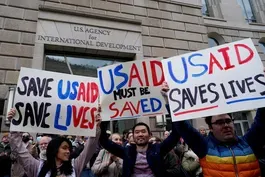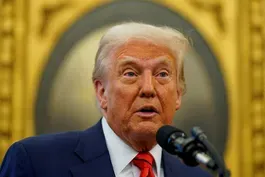
The history of diversity, equity and inclusion in America
Clip: 2/8/2025 | 7m 15sVideo has Closed Captions
The history of diversity, equity and inclusion efforts in America
Since President Trump returned to the White House, he’s issued executive orders that target diversity, equity and inclusion initiatives, dismantling decades of federal anti-discrimination policy. This Black History Month, John Yang explores the origins of DEI in America for our “Hidden Histories” series and Ali Rogin speaks with Shaun Harper of the USC Race and Equity Center for more.
Major corporate funding for the PBS News Hour is provided by BDO, BNSF, Consumer Cellular, American Cruise Lines, and Raymond James. Funding for the PBS NewsHour Weekend is provided by...

The history of diversity, equity and inclusion in America
Clip: 2/8/2025 | 7m 15sVideo has Closed Captions
Since President Trump returned to the White House, he’s issued executive orders that target diversity, equity and inclusion initiatives, dismantling decades of federal anti-discrimination policy. This Black History Month, John Yang explores the origins of DEI in America for our “Hidden Histories” series and Ali Rogin speaks with Shaun Harper of the USC Race and Equity Center for more.
How to Watch PBS News Hour
PBS News Hour is available to stream on pbs.org and the free PBS App, available on iPhone, Apple TV, Android TV, Android smartphones, Amazon Fire TV, Amazon Fire Tablet, Roku, Samsung Smart TV, and Vizio.
Providing Support for PBS.org
Learn Moreabout PBS online sponsorshipALI ROGIN: Since President Donald Trump returned to the White House, rolling back diversity, equity and inclusion initiatives has been at the top of his agenda.
He's issued executive orders that target DEI programs, dismantling decades of federal anti-discrimination policy.
For Black History Month, John Yang explores the origins of DEI in America in our latest installment of Hidden Histories.
JOHN YANG (voice-over): Long before DEI became a household term, there were other efforts to move toward equal rights for all Americans.
Some of the earliest were in the late 1800s, during the post-Civil War Reconstruction era, as Southern states enacted Jim Crow laws making segregation in public spaces legal.
Congress established the Freedmen's Bureau.
It provided formerly enslaved people basic necessities, helped them look for jobs and acquire land of their own.
In 1866, President Andrew Johnson vetoed legislation to enforce those amendments, arguing that it discriminated against white people.
And pressure from white Southerners led to the closure of the Freedmen's Bureau just seven years after it had been established.
Nearly a century later, black Americans were still battling racism and discrimination.
CROWD: Freedom, Freedom, freedom.
JOHN YANG (voice-over): Led by icons like the Reverend Martin Luther King Jr., they united during the civil rights movement, pushing back against the systems that excluded them.
At the height of the movement, John F. Kennedy became the first president to call for affirmative action, using the term in an executive order targeting racial bias in the hiring practices of government contractors.
In 1964, President Lyndon Johnson signed the landmark Civil Rights Act, which banned employment discrimination based on race, color, religion, sex and national origin.
By the 1990s, a backlash had emerged over affirmative action, voters in California, Washington State, Michigan and Arizona banned its use in public employment and higher education admissions.
Then, May 25, 2020, George Floyd was killed by Minneapolis police, igniting months of protest across the nation and around the world.
MAN: Stand Up and fight.
JOHN YANG (voice-over): Racial justice was back in the nation's collective conscience, this time with support from large corporations, many of them created DEI committees and pledged to invest billions of dollars to promote racial equity.
But companies began ending these initiatives after the Supreme Court in 2023 banned affirmative action in college admissions.
Last month, Target joined a growing list of companies pulling back on their DEI commitments.
At the same time, though, employers like Costco and Delta Airlines are doubling down on theirs.
Today, DEI has become a political lightning rod, but its roots run deep in American history, and the quest for equity and justice goes on.
ALI ROGIN: Earlier, I spoke to Shaun Harper from the University of Southern California's Race and Equity Center.
I asked him to explain how the current debate surrounding DEI fits into its broader history.
SHAUN HARPER, USC Race and Equity Center: I think that this is a very particular moment in which the three letters DEI are being scapegoated, villainized.
Everything is being blamed on those three letters.
But as it turns out, most polling shows that most Americans actually believe that diversity is a good thing for our country, that people ought to be treated equitably, and that workplaces and retail environments and schools and so on ought to be inclusive environments.
So the sort of broader ideals of DEI very much remain at the American core.
But it's just that those three letters, the three letter acronym, is being politically scapegoated during this time.
ALI ROGIN: Why has it become so politicized?
SHAUN HARPER: Let's rewind almost five years ago when Minneapolis police officer Derek Chauvin murdered George Floyd.
And we all saw it play out via Darnella Frazier's video footage.
You know, that forced a global reckoning with structural and systemic racism here in the United States.
That was a conversation, frankly, that most Americans didn't care to have, and they were certainly unprepared to have it, but yet they were dragged into it.
So what we saw almost immediately, you know, after that summer of racial reckoning, if you will, was a bit of an allergic reaction.
Well, that allergic reaction then became legislative as states across the country began to defund and ban the teaching and learning about diversity, equity and inclusion in schools and DEI offices.
So I don't blame the whole thing, obviously, on Derek Chauvin's murder of George Floyd, but it certainly marks a pivotal chapter in our nation's history.
ALI ROGIN: As you mentioned, there are DEI programs that came about at companies and government entities across the country.
What was the intended goal of those sorts of efforts?
SHAUN HARPER: The intended goal of those efforts was to right America's past and present wrongs as it pertains to racism, sexism, homophobia, transphobia, disability, discrimination, so on and so forth.
Those efforts certainly were not intended to divide people or to sort of force them into two categories, privileged and oppressed.
That's the narrative that's sort of wrapped around misinformation.
But most of those efforts were the antithesis of that.
They intended to bring people together.
They intended to help close gaps, and they intended to help us think about how to make our schools and companies and our communities, you know, more fair and more inclusive.
President Trump in his initial days announced that he was going to be ridding the federal government of anything pertaining to DEI and those individual words.
Certainly we don't yet know the scope of what that really means.
There's a lot in flux.
But I'm wondering, from your perspective, what is that going to mean for Americans?
SHAUN HARPER: It's bad for our democracy.
It will lead to greater polarization.
It will lead to more divisiveness.
It will lead to lots of people losing their jobs.
Federal professionals who do DEI work as well as professionals in corporations and in other places will lose their jobs because they're caught in the political crosshairs, not because they've done something bad.
What we will also see is an uptick in costly litigation that will cost the American taxpayers millions, perhaps billions of dollars as many Americans are experiencing harassment, discrimination and abuse.
You know, DEI policies and programs, again, help to protect against those things.
ALI ROGIN: Sean Harper, founder of the USC Race and Equity Center.
Thank you so much for joining us.
SHAUN HARPER: Thanks so much.
Fate of USAID in question as judge sets back Trump’s plans
Video has Closed Captions
Fate of USAID in question as judge sets back Trump’s efforts to dismantle agency (5m 39s)
How a NASA mission may help us understand life’s origins
Video has Closed Captions
How NASA’s OSIRIS-REx mission may help us understand the origins of life on Earth (2m 45s)
News Wrap: Trump takes aim at Kennedy Center trustees
Video has Closed Captions
News Wrap: Trump takes aim at Kennedy Center’s board of trustees (2m 39s)
‘The Power Pause’ aims to rebrand stay-at-home motherhood
Video has Closed Captions
‘The Power Pause’ aims to rebrand what it means to be a stay-at-home mom (5m 27s)
Providing Support for PBS.org
Learn Moreabout PBS online sponsorshipMajor corporate funding for the PBS News Hour is provided by BDO, BNSF, Consumer Cellular, American Cruise Lines, and Raymond James. Funding for the PBS NewsHour Weekend is provided by...
















